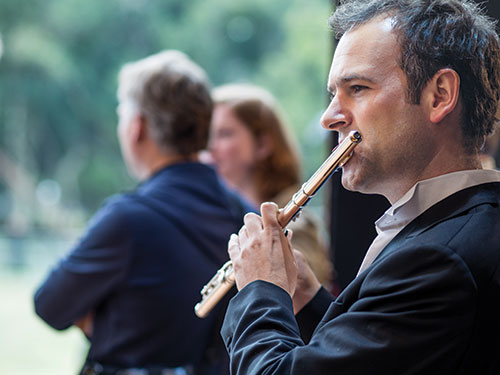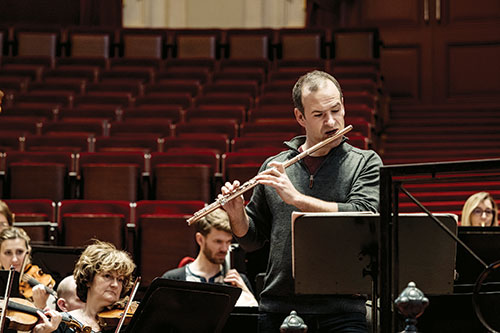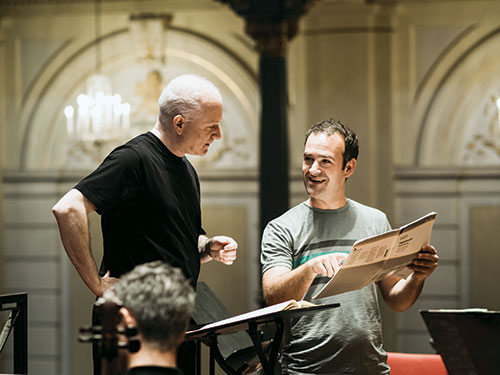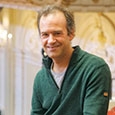Kersten McCall, solo flutist of Amsterdam’s Royal Concertgebouw Orchestra, is one of the most gifted and successful flutists of his generation. His impeccable technique, precision, musicality, and most of all his love and passion for a huge range of music inspires not just flutists but musicians the world over. He also teaches a talented studio of young flutists at the Conservatorium van Amsterdam.
Playing music and being a musical person – there was no choice. It was the most natural thing. For my father, life was music. Everything was music. Even things he looked at, he tried to translate into music. He once wrote a piece about a refrigerator that was invented by Albert Einstein. It never went on the market and was called Einstein’s Kühlschrank. It was for flute, accordion, trumpet, cello, piano violin.
How did your father end up in Germany?
When he was around 30, he left for Germany from the United States at the suggestion of Isang Yun to study composition in Freiburg with Wolfgang Fortner. I met Isang Yun when I was 16 after participating in a competition where I had won a prize for my performance of one of his pieces. When I met him, I said “I’m standing here thanks to you!”
When my father came to Freiburg, it was the place to be if you wanted to study flute. Aurele Nicolet was teaching there, and he came up with the idea to request new compositions from students for his flute students to play during class recitals. My dad was the only one to respond to his request, so he got the chance to write a lot of flute music.
When did you start playing the flute?
I started playing the recorder at age 6 and the flute at 9. As a child, I had pectus excavitum which is a problem with the ribs and sternum that caused my ribs to curve too far inwards. I might have grown out of it normally, but since it was quite deep, my doctor advised my parents to let me learn a wind instrument that required a lot of air. They started indoctrinating me by pointing out the flutes at concerts. I always thought they looked so special. I do think sometimes that I also could have been a good cello player. I was not a huge talent on the flute as a child, and my sound was not something that was charming. It never has been, really. I had good fingers though. Later on, you learn that it is not about the sound. It is what you make with it. I am actually always a bit on alert if a sound is too sweet. The human voice is not sweet, at least not the expressive side of it. For me, a sweet voice doesn’t touch me as much.
Who was your first teacher?
Her name was Michelle Buchmann. She was a student of Nicolet’s at the time. Nicolet retired that year. I still remember the concert that was held upon his retirement and William Bennett’s commencement. She was a great teacher. After a year, I could play some real little pieces. I was already quite good at recorder, so the fingerings came relatively quickly. After a year, I decided to enter a regional competition. I told my parents it was because I wanted to win money. I ended up winning the youngest category that year.
From that moment, I decided to enter the competition every two years and did until I was 19. I won nearly every time and got to the German national level where I was told that I did not have enough vibrato and that my sound was not sweet enough. They asked me what music I listened to.
I told them, “only the pop songs from the radio.” I did not know any classical music. They thought I was a hopeless case.

When did you decide to make a career out of music?
I had decided that by age 17. There was no specific turning point. Flute was just the thing I had always been good at. It was the status quo; the thing that was always present in my life. I did not think it would be that easy to become a professional musician, so I was thinking about other plans. Music was always just there. I worked very hard for it, but it always felt more like talent than work. When I admitted to myself that it was my life now, that made things very simple.
I had been studying with Felix Renggli between the ages of 12 to 19. He was my teacher in every way you can imagine. He was my role model, my idol. He was the most important person in my musical life. Eventually he became too famous and was barely home. The year I was 18, I only had two lessons from him. He agreed I should look for a teacher at a conservatory. When I went to a music shop to buy my flute (the flute I still play today), the man who was helping me suggested that I should consider studying at the Hochschule für Musik in Karlsruhe with Renate Greiss. So I called her, and the first thing she asked me was, “Are you the son of Brent McCall?”
In a sense, I fell into this career, but pretty soon, even before entering the conservatory system, I realized that it was going to be hard. There were too many things that I wanted to be able to do that I couldn’t.
I remember following the careers of people like Pahud and Alanko. There was no internet at the time, so there were all these stories floating around about how they were playing. They turned out to be true because these flutists could do the most amazing things, especially with dynamics. I became interested in playing as dynamically as possible and I couldn’t. It matters less to me now. Showing how softly or how loudly you can play is not what it is all about. It is something you do in competitions, something that is rather easily measurable.
I was trapped in this cycle, and it made my life at school very hard. During my second year at school I practiced so hard that my back just could not take it anymore. That was my first deep crisis. I then decided to stop and go study architecture. I called my parents and said “I can’t do this anymore.” Renate Greiss looked at me and simply said “Oh, but it’s not so bad.” She gave me the idea to have someone in the room with me when I was practicing. I was in a different world while practicing. I was trying to do very extreme things that perhaps were not possible on the flute – at least not for me at the time – and my body just could not take it. My penchant to seek out the extreme landed me in an immense crisis that only I could pull myself out of.
During our family’s summer holiday in Iceland, I was absolutely craving playing the flute. Crisis over. I signed up for the ARD Competition with three weeks to go and prepared like crazy. I simply had to play the flute again.
How would you prepare for a competition?
I need periods of intense practice, but not for too long. When I was preparing for the Kobe competition, the period was about two months long, and I started by preparing the final round. I knew I would make it to the final; or rather, I absolutely would not enter a competition without complete belief that I could make it to the final. Then, I worked backwards.
A couple of years earlier, I took part in the Prague Spring Competition and was completely unprepared for the final round. I underestimated the situation and was so arrogant at the time that I thought I would be able to win it anyway. I am glad I was able to learn from my mistakes.
What type of music were you interested in as a student?
As a student, I thought most flute players were going down the wrong path as not enough were playing contemporary works, and I did not understand Baroque music or Schubert at all. I was only interested in how extreme one could be on the flute, especially in contemporary music. It is the perfect playground for extreme techniques.
I formed a chamber group back then. Due to an aversion to conductors, we all decided to learn the most extreme and difficult music and then play it without a conductor, which sometimes took a year of preparation. I learned a lot from chamber music playing. I like to call it musical empathy. Sometimes I make four of my students play together and try to cue each other without excessive movements to see how deep the empathy goes.

Does this also apply to orchestral playing?
Yes, you have to be able to play with your colleagues who are sitting behind you, for example, and you always have to react to your ears, not your eyes. The eye is not a good instrument for measuring time. I was not particularly interested in orchestral playing when I was young, but I have youth orchestra to thank for my career. It helped me build up my whole network, and I had such a great time playing in those orchestras.
How did you come to audition for the Concertgebouw Orchestra?
During my final year in Karlsrühe, Renate asked me what I was going to do. She said that I did not need any more time studying. I had done a five-year undergraduate degree, which is all I have to this day. I never even considered the possibility of orchestral work to be honest. I just wanted to play contemporary chamber music. She said that I needed to be able to feed myself and pay rent, and pointed me in the direction of an audition for a spot in the Deutsche Radio Philharmonie Saarbrücken. I won the position and stayed there for nine years.
I was growing a little unhappy with the artistry of the conductors although I enjoyed living in the city and liked my colleagues. Eventually I told my wife that I had to apply for something bigger. The position in the Concertgebouw had been available the year before, but I had decided against it because I had a young family. Money was tight, so I thought I would just put up with it for the sake of security. When the position came up again – even though our situation hadn’t really changed – I took it as a sign and thought maybe they are waiting for me.
What was the audition like?
It was my first time coming to Amsterdam. I arrived with a terrible cough, and the other people applying looked at me like I was crazy to be taking part. I only just made it to the final round – I think because the jury wanted a larger pool of contestants. The final round was really my thing, though. I had to play the Reinecke concerto. I later found out that I was the only one to play it by heart. I like to do this as much as I can. When I play a big solo in orchestra, I never really like to look at the music. The audition for the RCO also let me make use of the chamber music skills I had been honing for years. We played a lot of excerpts with either piano or chamber music partners from within the RCO. I remember playing the famous William Tell excerpt with the English horn.
What is the RCO’s flute section like?
There are five of us from five different countries: Emily Beynon, the other solo flute, Mariya Semotyuk and Julie Moulin, the two seconds, and Vincent Cortvrint, the piccolo player. We are close friends who share the deepest of respect. If I ever have to drop out of a concert, I trust any other member of our section to be able to fill in for me. There is no weak link in the section. They can do things I could never do. The level of musical empathy in the two second flutes is absolutely unbelievable. I can do anything I want musically, and they will be there with me. We have grown together. I am fascinated by it and thankful for it every time.
What are your thoughts on conductors?
I think that conductors not only receive too much money but also too much attention. There are a few excellent musicians and interesting personalities amongst them, but generally I am more inspired by musicians playing instruments or composing beautiful music. A good conductor is a good orchestra coach who allows the musicians play at their highest level or even beyond. Or, as Mariss Jansons says, “I simply try not to disturb them from playing beautiful.”
What is your favorite part of being a musician?
I am a bit of an extrovert. I am very direct in what I say, and sometimes like to provoke people. I do this because I know I can make it up to people again. I find that too often in our society, once you are an enemy, you are an enemy for good. There is no way to solve it. That is why we always try to stay friendly no matter what, but that is wrong. You can stay friendly, but you also have to talk about problems. When you are a teacher and you try just to be nice, it does not help. As a colleague, I sometimes say things that are unpopular, but I know I can make things good again. I like people to wake up and react. This is my nature, and I do the same thing in music. Sometimes, I find myself playing too over the top, exaggerating things too much. But I mean it – it’s honest. It comes from the heart. I do enjoy pushing the limit, maybe even offending people through music, as long as I can connect to them. My ideal musical situation is just me, my audience, and nothing in between. Not even a music stand. I want to connect to people in the first row. I like to think of myself as an actor and think of the music as text. My favorite part of music is communication.

Do you recognize the influence of your teachers on the way you teach?
To an extent, of course. There are certain tips and tricks I teach, certain exercises I use, and even little stories that I tell. However, the way that I learned the flute was very methodical; I taught myself a lot of things. I was constantly inventing new exercises. I teach that to some students, but it does not work for everyone. It can cause dystonia in some people because it is so mechanical. All I can say is that there is no master plan for everyone. The one thing I really do believe in is create automatisms in the brain. Not only technically, but harmonically. I always know what key I am in and what the relationship is between chords and melody. If it does not make sense to you, if you only rely on theory, you end up relying on instinct. That is something I don’t really like. Having a feeling for harmony, dissonances, consonances is important, and for that you need certain automatisms in the fingers. I feel chords in my hands. I think of flute fingerings even when playing the piano.
This comes from studying the whole second book of Taffanel and Gaubert. The exercises go quite quickly and move through the circle of fifths. The circle of fifths is our periodic table. Whenever someone is talking about how magical a chord is, I always just know what it is in my head. Understanding something does not make it less magical. You can know exactly how something has been made, but still not know why you cry every time you listen to it.
Do you look for etudes that are technically challenging or more musically challenging?
Technical, for sure, but I always try to play them as entertainingly for myself as possible. I am very selective with studies. My favorite ones are Taffanel & Gaubert’s Douze Grands Etudes. These are also Galway’s favorite studies. They are all about sound equality. There should never be a weak moment in the sound. I also enjoy playing Paganini’s 24 Caprices. I play the second and twelfth daily. They are fantastic exercises for the flute, and you never really get to the point where you think “I can play this now.” They remain the pinnacle of flute technique for me.
What are your favorite concertos?
I have a deep personal connection to Lotta Wennaköski’s Soie. (A recording of McCall playing this concerto with the Finnish Radio Orchestra is available on Spotify and on CD.) It is a piece that is so good for me personally as a player because it is so extreme. I can really put my personal stamp on that piece. I want to invite as many flutists as possible to play this fantastic piece.
The same goes for the Nielsen concerto. You can play the Nielsen in so many ways. There is no particular style. The only style that does not work is being shy. You have to use a lot of rubato, and there is tons of motion. The fact that Nielsen himself made so many dynamic changes during the rehearsals of this piece showed how spontaneous this music has to be. Do something with it. It is really a playground for flutists who like to play roles.
I have to say that Mozart is not my favorite composer. I guess it’s a bit like saying spaghetti is not my favorite dish, or Rembrandt is not my favorite painter. He was of course a genius, a wunderkind. However, I think that the Concerto No. 1 in G Major, K.313, especially the second movement, is rich in harmonic invention. A lot of people do not realize how advanced this music was for its time. It is a nice place for me to test out my skills in music theory. I love how the third movement really reflects Mozart’s opera compositions. The first movement is incredible because there is almost no melody for ten minutes, but it is so memorable. A scale in thirds up? Somehow, it’s genius. This variety makes playing this concerto a very rich experience.
What characteristics and skills do you think are necessary in someone who wants to pursue a career in music?
What I try to teach is that you should always be yourself. I can spot quite early on when someone is hypnotized by the mainstream. They then see themselves as too small. Those people rarely make it. I want to encourage people to really love music, rather than the world of music. Loving music means always wanting to learn more about all different kinds of music. I have the feeling that some people only love the world of music. I cannot blame young people for this fascination, but one has to learn what it means to be a musician. Some people practice a lot and get to a certain level, only to realize that they were not a musician at heart. That road does not lead to happiness or satisfaction. Think about what you like. Be honest. You can always change. When Renate asked me years ago what my favorite and least favorite eras of music were, I replied that I hated Bach and loved the Carmen Fantasie and the Ibert Concerto.” That was my world back then. You can see how much that’s changed.
What are your hobbies?
My dad taught me to cook from an early age. Simple things, but at a very high level with good ingredients. My wife would tell you that my specialty is opening the fridge, seeing a bunch of leftovers and random bits and pieces, and making a beautiful meal out of that. Sometimes it is the colors that inspire me, and sometimes the taste and the aroma. I enjoy the emotional aspect of food. The memory of smells lingers the longest in the brain. If you can trigger that once in a while, it is an amazing thing. The best part of traveling is food.
I also love mountain climbing. A few weeks ago, I went climbing with some colleagues in the Austrian mountains in knee-deep snow. It was fantastic.
What role does fitness play in your playing?
I cannot overstate how important fitness is. A few years ago at James Galway’s course in Weggis, a fitness expert from Zürich came to give a talk. He scanned the room, and said that not a single one of us was fit enough to be a flutist. That stopped me and made me think. Why do I see so much bad posture? Why do I see so many locked knees? I recommend fitness to everyone, not just musicians. You feel better when you are in good shape. The goal is not to have a chiseled body, it is to be comfortable. I enjoy and recommend Pilates.
What music do you enjoy listening to?
There are no genres in particular I gravitate to. I even love musicals. The sheer songwriting talent of someone like Andrew Lloyd Webber is incredible. Even though there is a lot of his stuff that I think is quite bad, I still am amazed. I also love film music. Bernard Herrmann is a great composer, and Jerry Goldsmith is one of my heroes. Basic Instinct has a fantastic score, and we don’t even have to talk about John Williams. What a fantastic musician. The only really well-known artists I can think of right now that I listen to a lot are Sting and Björk. They are just outstanding musicians all around.






